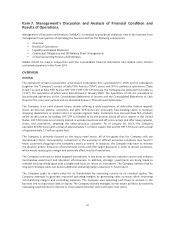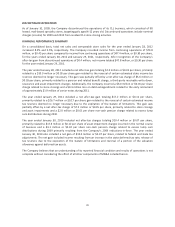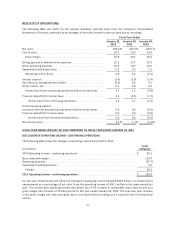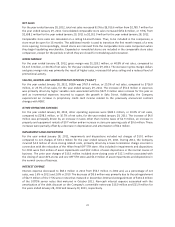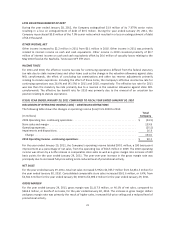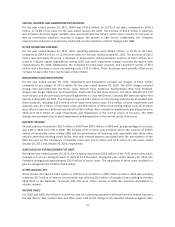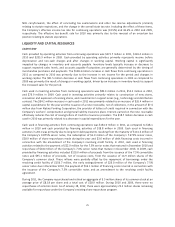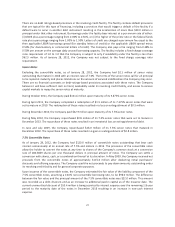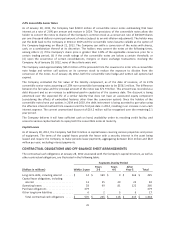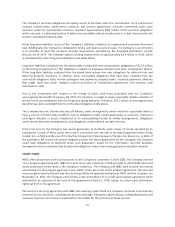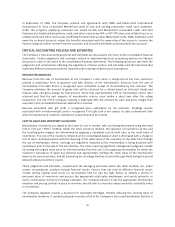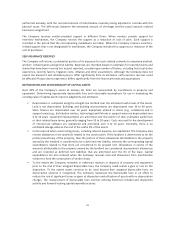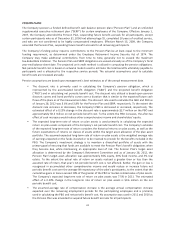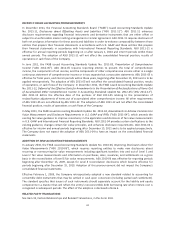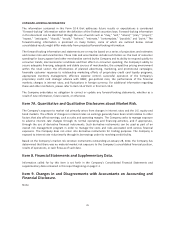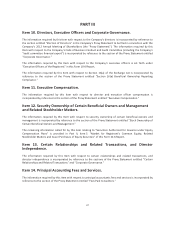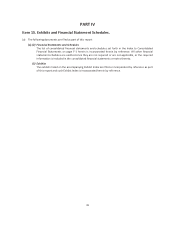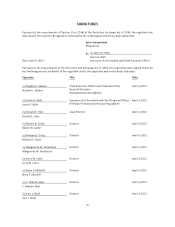Saks Fifth Avenue 2011 Annual Report Download - page 31
Download and view the complete annual report
Please find page 31 of the 2011 Saks Fifth Avenue annual report below. You can navigate through the pages in the report by either clicking on the pages listed below, or by using the keyword search tool below to find specific information within the annual report.The Company’s purchase obligations principally consist of purchase orders for merchandise, store construction
contract commitments, maintenance contracts, and services agreements. Amounts committed under open
purchase orders for merchandise inventory represent approximately $462 million of the purchase obligations
within one year, a substantial portion of which are cancelable without penalty prior to a date that precedes the
vendor’s scheduled shipment date.
Other long-term liabilities consist of the Company’s liabilities related to its supplemental executive retirement
plan. Additionally, the Company is obligated to fund a cash balance pension plan. The Company’s current policy
is to maintain at least the minimum funding requirements specified by the Employee Retirement Income
Security Act of 1974. The Company expects funding requirements of approximately $4.4 million in 2012, which
is included within other long-term liabilities in the table above.
Long-term liabilities excluded from the above table include deferred compensation obligations of $12.4 million
as the timing of payments for this obligation is subject to employee elections and other employment factors.
Other long-term liabilities excluded from the above table include non-cash obligations for deferred rent and
deferred property incentives. In addition, other unrecorded obligations that have been excluded from the
contractual obligations table include contingent rent payments, property taxes, insurance payments, amounts
that might come due under change-in-control provisions of employment agreements, and common area
maintenance costs.
Due to the uncertainty with respect to the timing of future cash flows associated with the Company’s
unrecognized tax benefits at January 28, 2012, the Company is unable to make reasonably reliable estimates of
the period of cash settlement with the respective taxing authority. Therefore, $14.2 million of unrecognized tax
benefits have been excluded from the contractual obligations table above.
The Company has not entered into any off-balance sheet arrangements which would be reasonably likely to
have a current or future material effect, such as obligations under certain guarantees or contracts, retained or
contingent interests in assets transferred to an unconsolidated entity or similar arrangements, obligations
under certain derivative arrangements, and obligations under material variable interests.
From time to time the Company has issued guarantees to landlords under leases of stores operated by its
subsidiaries. Certain of these stores were sold in connection with the sale of the Saks Department Store Group
to Belk, Inc. in 2005 and the sale of the Northern Department Store Group to The Bon-Ton Stores, Inc. in 2006. If
the purchasers fail to perform certain obligations under the leases guaranteed by the Company, the Company
could have obligations to landlords under such guarantees. Based on the information currently available,
management does not believe that its potential obligations under these lease guarantees would be material.
CREDIT CARDS
HSBC offers proprietary credit card accounts to the Company’s customers. In April 2003, the Company entered
into a program agreement with HSBC for a term of ten years expiring in 2013 pursuant to which HSBC owns and
issues proprietary credit cards to the Company’s customers. The Company and HSBC have entered into several
amendments to the program agreement since 2003. Under the terms of the program agreement, the risks and
revenues generated by interest and fees on the portfolio are apportioned between HSBC and the Company. On
November 11, 2011, the Company entered into a sixth amendment of its credit card program agreement which
provided for an extension of the term of the agreement to April 15, 2018, subject to certain early termination
rights set forth in the agreement.
Pursuant to a servicing agreement with HSBC also expiring in April 2018, the Company continues to provide key
customer service functions, including new account openings, transaction authorizations, billing adjustments and
customer inquiries, and receives compensation from HSBC for the provision of these services.
29


